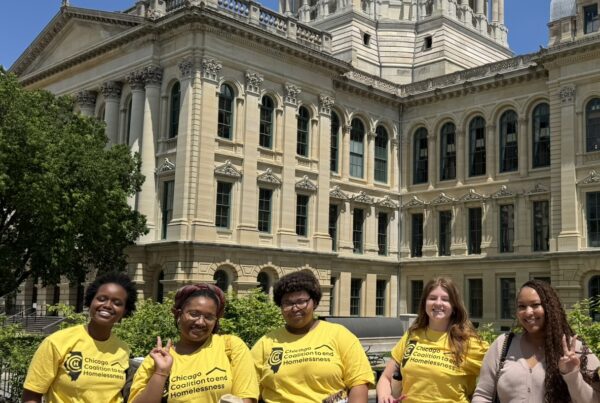CCH community organizers registered 400 homeless people to vote this fall, with outreach offered at more than 20 Chicago shelters and community sites.
Grace period registration and same-day voting is available through Election Day, on Tuesday, November 8.
Statewide, residents can go online to register themselves or update their registration through October 23, via the Illinois Board of Elections.
“Our organizers, leaders and interns worked hard to outreach to prospective voters experiencing homelessness. Leaders helped file 316 registrations on Friday and we delivered 84 more by the paper-filing deadline on Oct. 11,” said Community Organizer Keith Freeman.
With a big registration push started during National Homeless and Low-Income Voter Week, CCH staff and interns registered people at sites including Breakthrough Urban Ministries, Deborah’s Place, the Ewing Hotel, Franciscan House, IDHS’s 10 S. Kedzie shelter, Madonna House, and Bubbleland Laundry, 5101 S. Western Avenue.
What to do if you’re homeless and want to vote
CCH Policy Specialist Niya Kelly, an attorney, writes an explanation of what someone experiencing homelessness must do to register to vote in the upcoming presidential and statewide election.
Information was compiled with help from the Chicago Board of Elections. The city elections board sent senior staff to train us on homeless voting issues in September.
Elections officials strongly recommend early registration and voting as a better way to timely handle any issues that arise.
Illinois residents who are homeless have the right to vote in the presidential and statewide elections even if they are not yet registered to vote.
You are considered homeless if you are living on the street, in shelters, or doubled-up in the homes of others.
To register to vote, you must:
– Be a U.S. citizen
– Be 18 years old by Nov. 8 (born on or before November 8, 1998).
– Not be in prison or jail serving time for a conviction, and,
– Not claim the right to vote elsewhere.
In order to register to vote, Illinois requires that a homeless person be able to receive mail at the address provided on his/her voter registration form.
Examples of an acceptable address include a relative’s home, or a drop-in center or shelter that accepts clients’ mail. Once registered, the voter’s polling place is selected based on the address provided on the registration form. If experiencing homelessness, the voter is permitted to return to this polling place as long as the address they listed remains the place where they receive their mail.
The ability to vote is not dependent on having your own home. Like everyone else, homeless people feel the direct effects of decisions made by political leaders elected to represent our community. It is important that people experiencing homelessness know that they can and should exercise their right to vote.
People experiencing homelessness can exercise their right to vote, as protected by state and federal law, including the 2013 Illinois Bill of Rights for the Homeless Act.
For Election Day assistance, call these help desks:
– Chicago Board of Elections, (312) 269-7870
– Cook County Clerk David Orr’s office, (312) 603-5656
– The Law Project at the Chicago Coalition for the Homeless, 9 a.m. – 5 p.m., 1 (800) 940-1119.
Benefits of early registration, early voting
We join elections officials in recommending that homeless voters take advantage of early voting.
If any issues arise with your registration or voting, voting early before Election Day will give you, the election judge, and the Board of Election ample time to rectify the situation. Early voting in Illinois began Sept. 29 and runs through Monday, Nov. 7.
In Chicago, early voting is offered at 69 W. Washington St. (on the concourse level). Early voting will be offered at 51 more sites starting Monday, Oct. 24.
You can register to vote early at all early-voting sites. Any voter who needs to register for the first time or file an address change or name change must present two forms of ID, one of which shows the voter’s current mailing address.
For the process of casting a ballot, a government-issued photo ID is not required, but it is helpful if there is a question about the voter’s registration, address, or signature.
What are acceptable forms of ID to vote?
Acceptable forms of ID include mail postmarked to the applicant; an Illinois driver’s license or state ID card; an employee or student ID; Social Security card; birth certificate; credit card; valid U.S. passport; lease or rental contract.
As one form of ID, homeless people can provide a letter from a drop-in center, shelter or the person with whom they are living double-upped. The letter must confirm that the named person has permission to use their address for the purpose of registering to vote.
To find Chicago early voting sites: http://www.chicagoelections.com/en/grace-period-registration-and-voting.html
To find suburban Cook County early voting sites: http://www.cookcountyclerk.com/elections/registertovote/Pages/GracePeriod.aspx
Registering on Election Day?
Illinois voters are able to register at the precinct polling place assigned to his/her residential mailing address — that is, the address provided on their state I.D. or driver’s license. You are required to bring two (2) forms of identification (ID), including one that shows proof of residence/mailing address.
When is identification necessary or not to vote?
Identification is not necessary if the homeless voter has already registered to vote at the polling place; the signature s/he provides matches the one on file; and an election judge does not challenge the person’s right to vote.
But identification is necessary if the homeless voter faces these situations:
– S/he registered by mail and did not include the Illinois ID/driver’s license number or Social Security number;
– An election judge challenges the person’s right to vote. Please note: A common reason for challenging a person’s right to vote occurs after the Board of Elections has sent mail to verify a voter’s mailing address, but the mail was returned.
– If a voter needs to show ID but cannot present ID, s/he may cast a provisional ballot. In order for that provisional ballot to be counted, the voter must present ID within seven (7) days of the election to the Board of Election.
Voting by mail
A voter may also choose to vote by mail. In order to vote by mail, a voter must apply online or mail in the Vote by Mail application.
The deadline to have a Vote by Mail application arrive to the Board of Elections is Thursday, Nov. 3 at 5 p.m.
A voter choosing to vote by mail will have the option to have his/her ballot sent to his/her registration address, another residential address in the USA (including a shelter or drop in center), a post office box in the U.S., a college or university dormitory in the U.S., or a foreign country.
Voting after a recent move, whether homeless or housed
If you moved within the same precinct within 27 days of the election, you can vote a full ballot by signing an affidavit.
If you moved outside of your precinct more than 30 days before the election and did not register in your new precinct, you may grace-period update your registration through Election Day, and then grace-period vote.
If you moved outside of your precinct less than 30 days before the election, but still live in Illinois and did not transfer your registration, you may grace-period update your registration to your new address through Election Day and grace-period vote. Or, you can vote a full ballot in your old polling place after completing an affidavit.










